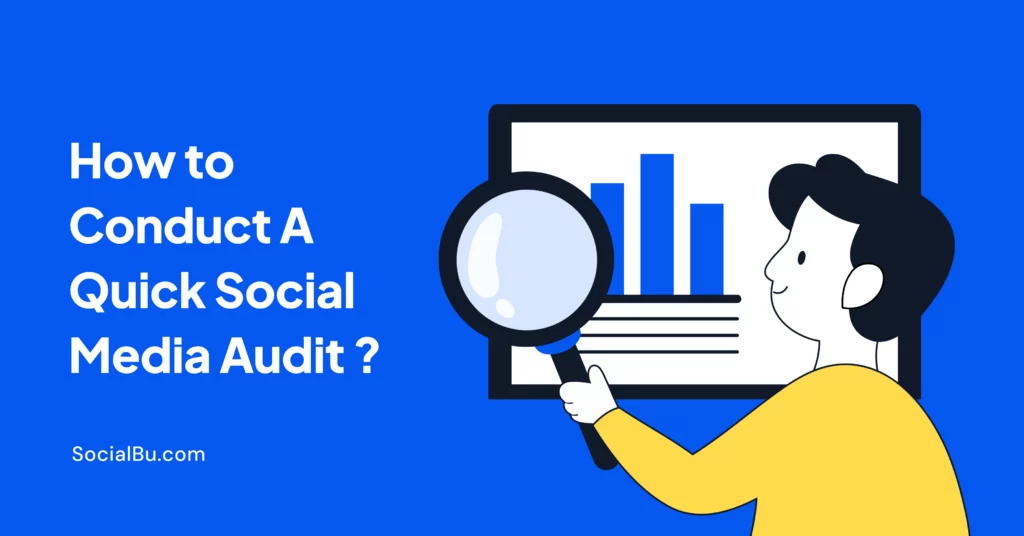Social media is one of the mediums that is creating an impact all over the world. People are making money through it. However, it is not easy to earn money through social media. You must play smart by assessing your social media accounts through a social media audit. But how to do it? What are the benefits?
This guide provides step-by-step instructions for conducting a social media audit. It also shares some examples of social media audits and recommends helpful tools to make the process smooth and efficient.
So, prepare to learn how to conduct a social media audit and improve your social media skills.
What is a Social Media Audit?
Social media auditing is a step-by-step process for assessing and optimizing social media accounts for business purposes. Simply put, it means appropriately reviewing your social media accounts to gain insights into them.
It also helps optimize your strategy, increase engagement, and drive better brand results. It’s essential for staying on top of trends and making informed decisions.
What can Social Media Audit Help You With?
A social media audit helps you understand what’s working and what needs improvement on your social media platforms. It identifies your strengths, such as attention-grabbing content, and weaknesses, such as areas that need improvement.
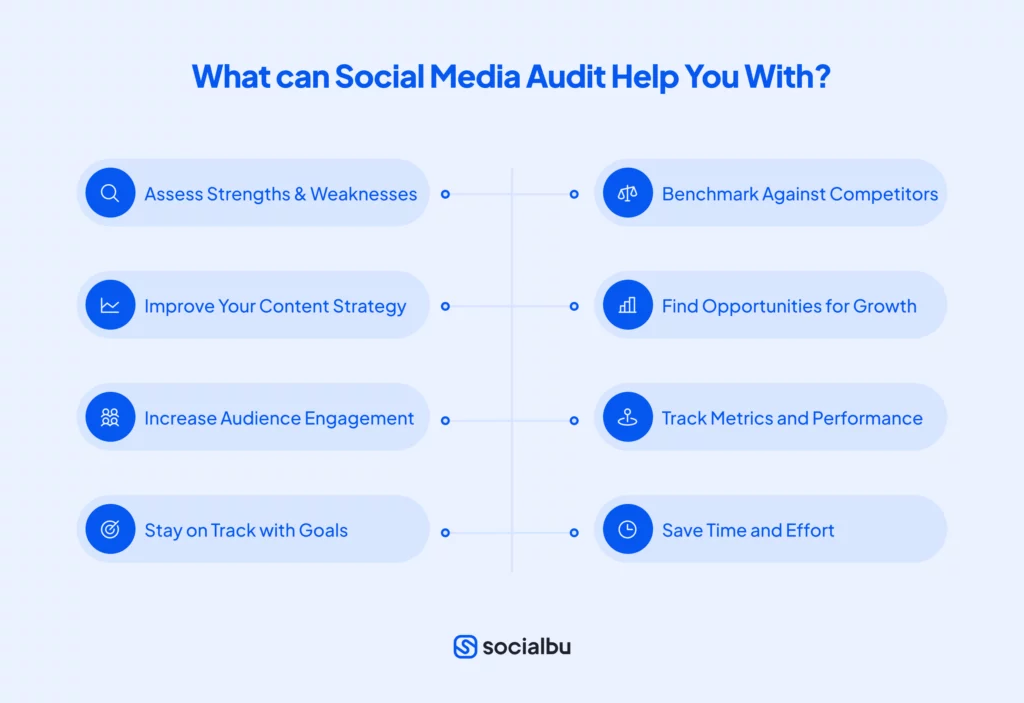
What are the Benefits of a Social Media Audit?
When you hear the word audit, it might sound like a company’s audit related to accounts and finance. But wait. If you are a business, you can audit your social accounts or hire someone.
The following are the key benefits;
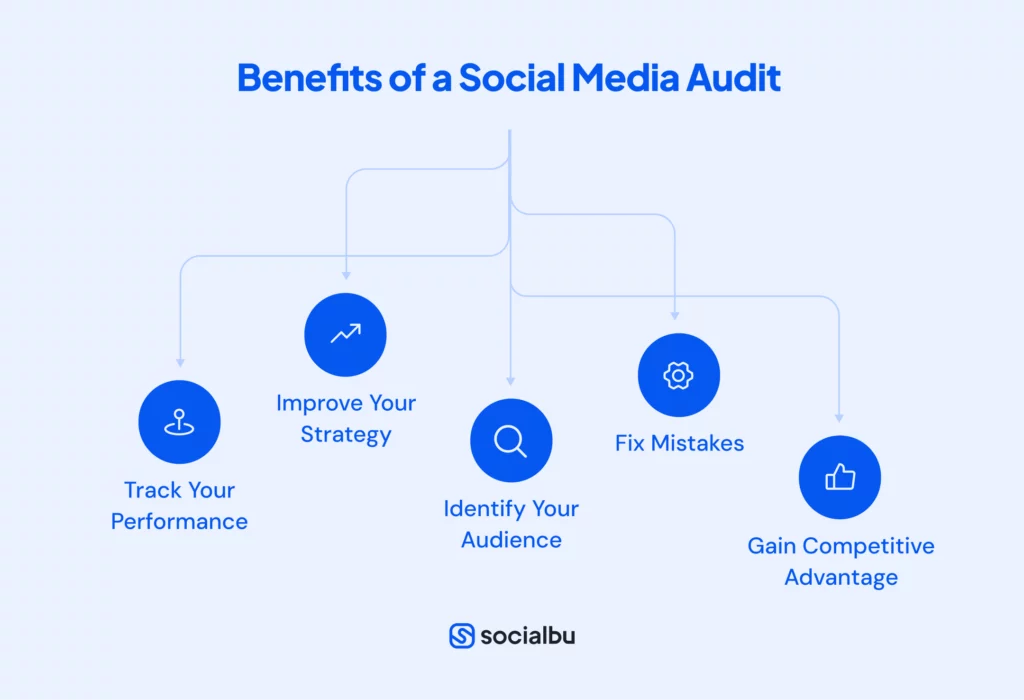
How to Conduct a Social Media Audit in 8 Simple Steps
Social media audits can be done by experts, mainly social media managers, who can deliver them to clients.
Below are the steps that social media managers implement;
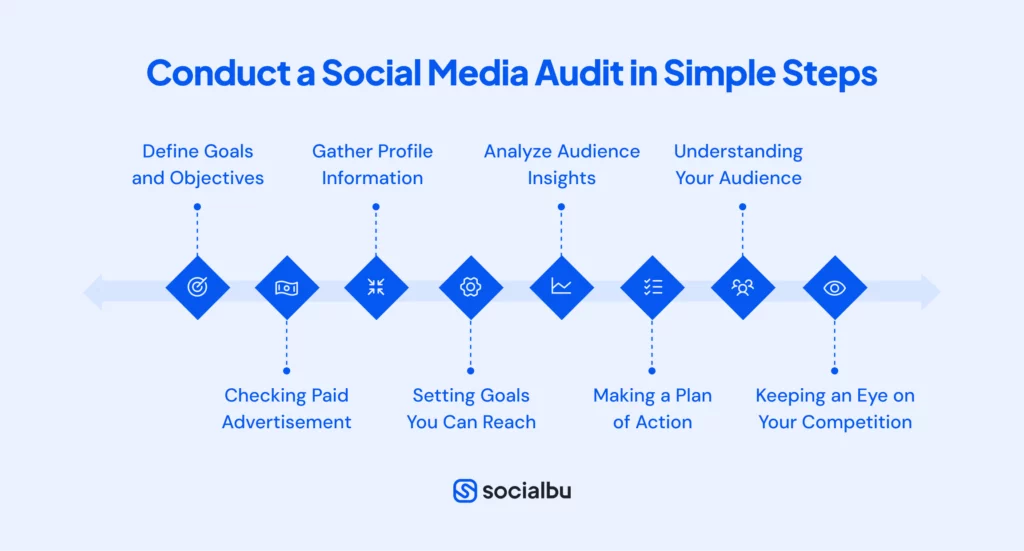
1. Define Goals and Objectives
Firstly, you must set your goals before conducting a social media audit. For example, a comprehensive audit can help you determine your goals, what your clients demand, and how it will improve your social media presence.
2. Gather Profile Information
After setting goals, it’s time to check all social media platforms (Instagram, Facebook, LinkedIn, and Twitter) to audit your social media accounts regarding profile picture, engagement, banner, profile optimization, comments, likes, and more. All accounts must be updated.
3. Analyze Audience Insights
After gathering the client’s account information, review audience demographics, engagement metrics, and trends to understand your target audience better.
4. Understanding Your Audience
While conducting an audit, social media marketers must closely examine the age group people engage with. You must also check whether your potential clients or targeted audiences engage with your content. This will help you determine what content to post on your social accounts.
5. Checking Paid Advertisement
If you’re running ads on social media, see how they’re doing. Are they reaching the right people? Are they turning into sales or sign-ups? If not, find out why your ads aren’t working correctly.
6. Keeping an Eye on Your Competition
Competitors are people who keep us motivated and inspired. So, you must follow them and look at what your competitors do on social media.
Are they getting more likes or followers? Or what type of content they are posting, etc.
7. Setting Goals You Can Reach
Set specific goals for each social media platform. Ensure they can be measured and achieved within a particular timeframe.
8. Making a Plan of Action
Based on your insights and the audit plan, what mistakes must be covered and not repeated? You must post more often and share different content on social media accounts.
By following all the above steps, you can grow bigger and bigger. Also, do not forget to keep auditing quarterly or semi-annually.
Social Media Audit Example
Examples are as follows:
Social Media Account: Nike
Content Strategy: Post athletic stories, inspirational posts, and fitness-related content
Engagement: Strong engagement with athletes and campaigns
Hashtags: #JustDoIt
Social Media Audit Tools
Social audit tools are a quick solution for people eager to learn about their social media analysis. These tools will help you check whether your business’s social media works appropriately.
You can learn about your account details, such as:
- Engagement
- Campaign performance
- Demographics
- Social media reviews
- Insights
Many tools are available to help with social media audits; let’s explore some in detail:
1. SocialBu
Socialbu is one of the best tools for social media auditing. It allows you to analyze your post-performance, track hashtag effectiveness, and measure engagement with your posts. You can see exactly how well your content is performing across different platforms.
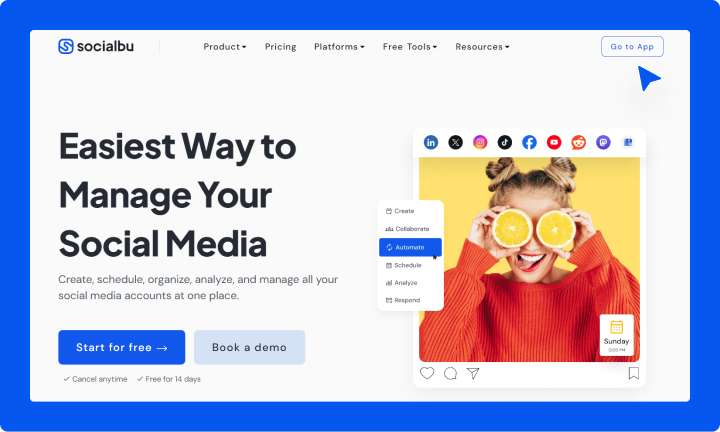
But that’s not all.
Socialbu also helps you generate content, write captions, and create images for your blogs. It allows you to collaborate easily with different teams and manage multiple brands, making it the best tool for businesses and content creators.
Key Features
- Social media posts publishing
- Instagram Stories Scheduling
- Bulk Import
- Scheduling Social media Monitoring
- Team Collaboration
- Twitter Threads Scheduling
- Social media Calendar
- Fully dynamic Automation
- RSS Feed integrations
- Social Media Analytics
- Android App
- 24/7 customer support
Starting Price
$8/month
2. BuzzSumo
This social media auditing tool helps you analyze the performance of your posts. You can also track trends, and it also offers powerful PR outreach insights. These features make it easier for you to understand your posts’ performance.
Key Features
- Content Research
- Find Influencers
- Monitoring
- Competitor Tracking
Pricing
Starting Price: $99/month
3. AgoraPulse
AgoraPulse’s social media auditing tool helps you save time by organizing your social media accounts in one place. It also offers team collaboration, allowing you to track your team’s performance.
Key Features
- Social media analytics
- Scalability
- Competitor analysis
- Post-performance
- Content calendar
- Collaboration
Starting Price
$99/month
Wrap Up
A social media audit in 2025 is essential for maximizing your online presence. By setting clear goals, analyzing audience and content insights, and learning from competitors, you can refine your strategy and achieve better results.
Remember to review and update your approach regularly to stay ahead in the fast-paced world of social media. With dedication and thoughtful planning, you can use social media as a powerful personal and professional growth tool.
SocialBu allows you to schedule Instagram posts, stories, and Reels and publish them on time. You can also respond to messages and comments, monitor hashtags, and analyze your top-performing posts.
FAQs
1. What is a Social Media Audit Exam?
The social media exam evaluates content strategy, engagement on social media platforms, and performance checks and balances to identify strengths and weaknesses.
2. What is the Role of Media in Social Auditing?
The media has performed well on all platforms over the past year, and its role in social auditing is highly significant.
It helps us in many ways, for example:
-Media highlights the issue, which leads to audits
-The media is always there to expose unethical behavior and wrongdoings.
-Media platforms can provide channels for stakeholders to voice their concerns, share experiences, and participate in the social audit process.
-Media outlets can effectively communicate the findings of a social audit to a broader audience.
-The media can encourage organizations to implement positive changes by reporting on the recommendations of a social audit.
